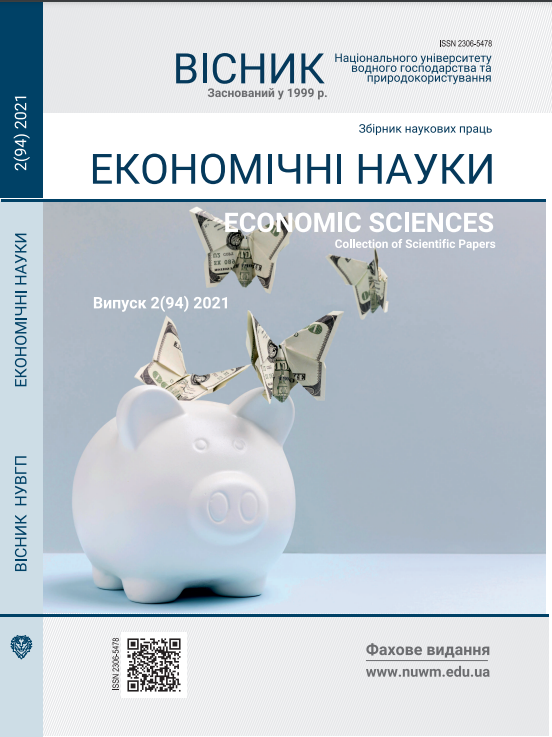INTERNATIONAL STRATEGIES OF ECONOMIC DEVELOPMENT AND FEATURES OF UKRAINE’S DEVELOPMENT
DOI:
https://doi.org/10.31713/ve2202113Keywords:
economic development strategies, COVID-19, neoprotectionism, strategy, investment, innovation.Abstract
For countries that are reforming national economies in the direction of creating socially efficient market systems, an important issue remains the adaptation of best international practices in the formation of their own strategies. A significant factor in economic growth now is the intensification of investment activities of domestic and foreign economic agents. In the macroeconomic aspect, investment activity is a process of shaping the future of the country’s economy. The article considers the development strategies of developing countries: the concept of «vicious circle of poverty», the concept of transition to self-sustaining growth, the concept of «big push» and its varieties: the concept of «balanced investment», «unbalanced growth» and «balanced growth through unbalanced investments». Ukraine, being one of the largest countries in Europe in terms of territory and population, is one of the poorest. Adherence to the neoclassical postulates of economic theory in the early 90’s of the 20th century did not help to get out of the structural crisis.In 2020, Ukraine ranks only 88th in the world in terms of GDP per capita.According to the results of 30 years of regulation of the Ukrainian economy,it has not been possible to realize the potential in natural resources,geographical location and quality of human capital. Considerable attention iscurrently paid to the formation of neoprotectionism, caused by the slowdownof globalization trends and the spread of acute respiratory disease COVID-19.The lag behind the countries of Central and Eastern Europe is explained not only by approaches to the transformation of the economic system, but also by differences in the ability to generate new and import existing advanced technological knowledge and institutions. In this case, we are also talking about various non-economic determinants that affect economic development – institutional features: freedom, observance of laws, ethical principles of economic activity, ideology, and so on. In the conditions of slowing down of globalization processes caused by the spread of COVID-19, the formation of the strategy of economic development of Ukraine should be based on the principles of industrialization of the economy and neoprotectionism.References
Про затвердження Національної економічної стратегії на період до 2030 року : Постанова Кабінету Міністрів України від 3 березня 2021 р. № 179. URL: https://www.kmu.gov.ua/npas/pro-zatverdzhennya-nacionalnoyi-eko-a179. (дата звернення: 30.05.2021).
Нуреев Р. М. Экономика развития: модели становления и модернизации рыночной экономики : учеб. пособ. М. : Норма, 2008. 367 с.
Світовий банк. Індикатори. URL: http://databank.worldbank.org/data/reports.aspx?source=world-developmentindicators#advancedDownloadOptions (дата звернення: 30.05.2021).
Темп приросту реального ВВП. Державна служба статистики України. URL: http://ukrstat.gov.ua/ (дата звернення: 30.05.2021).
Середньорічна чисельність населення. Державна служба статистики України. URL: http://database.ukrcensus.gov.ua/ (дата звернення: 30.05.2021).
Baran P. A. The Political Economy of Growth. New Delhi. 1962.
Nurkse R. Problems of Capital Formation in Underdevelopment Countries. Oxford. 1955. P. 5.
Rostow W.W. Theory of Economics Growth from David Hume to the Present. With Perspective to the Next Century. N.Y. : Oxford University Press, 1992.
Нікитенко Д. В. Інвестиційна безпека України: сутність та інституціональне забезпечення : монографія. Рівне : НУВГП, 2018. 376 с.
Nurkse R. Equilibrium and Growth in the World Economy. Cambridge, 1961.
Hirschman A. The Strategy of Economic Development. 1958.
Singer H. International Development. Growth and Trade, 1964.
Туган-Барановский М. И. Промышленные кризисы в современной Англии, их причины и влияние на народную жизнь. Спб., 1894. С. 175.
Бажал Ю. М. Актуальність ідей М. І. Туган-Барановського для теорії економічного розвитку. Михайло Іванович Туган-Барановський : особистість, творча спадщина і сучасність / під заг. ред. проф., д-ра екон. наук О. О. Шубіна, проф., д-ра екон наук А. А. Садєкова ; МОН України, Донецький держ. ун-т економіки і торгівлі ім. М. Туган-Барановського. Донецьк : Каштан, 2007. С. 196–213.
Бова Т. В. Державна інноваційно-інвестиційна політика України: теорія, методологія, напрями розвитку : монографія. Донецьк : Юго-Восток, 2011. 452 с.
Prescott E. Economic Growth and Business Cycles, with T. F. Cooley, Chapter 1 in T. F. Cooley, ed., Frontiers of Business Cycle Research, (Princeton University Press, 1995). 1–38.
Nikytenko D. Theoretical view on the problem of economic development of Ukraine. Science and education: trends and prospects : Collection of scientific articles. Ascona Publishing, New York : United States of America, 2018. Р. 57–64.

